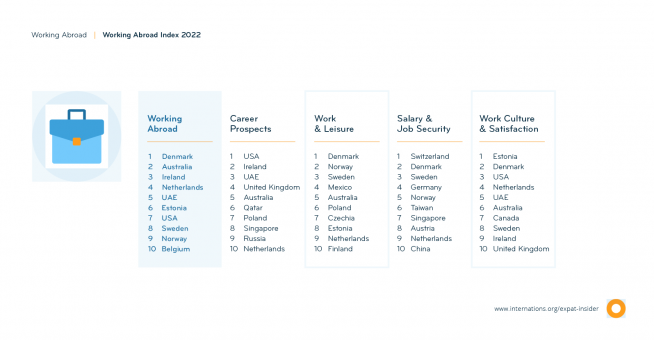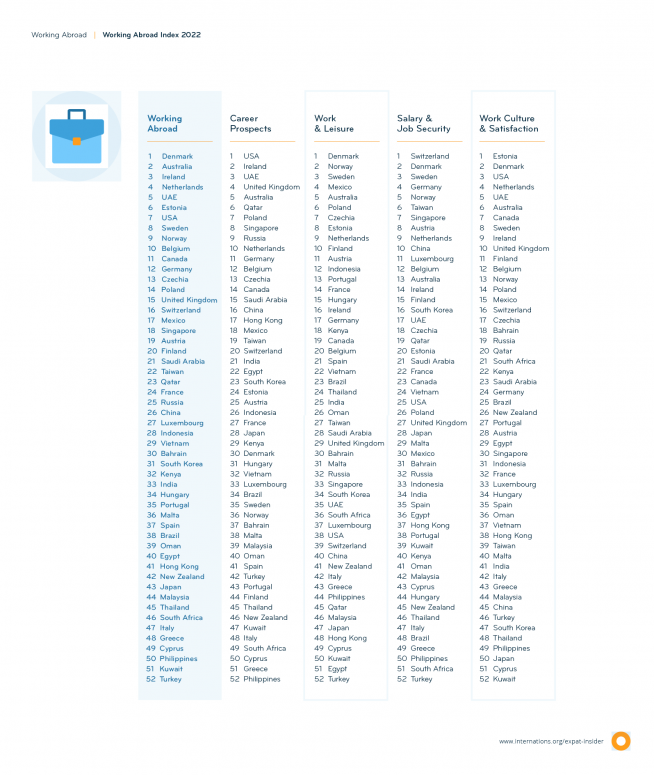From Great Job Markets to a Lack of Career Opportunities
Top Findings
- #1 Denmark is popular for its work-life balance and working hours.
- Expats in #2 Australia and #3 Ireland are happy with the local job market.
- #52 Turkey, #51 Kuwait, and #50 the Philippines make up the bottom 3 of the index.
- Seven out of the top 10 countries in the index are located in Europe.
- Asian countries make up four of the bottom 10 destinations in the index.
The Top 10
Methodology
The Working Abroad Index includes 52 countries and territories in total with a minimum sample size of 50 respondents per destination. It is based on four subcategories with at least two factors each. The Career Prospects Subcategory factors in the local job market, personal career opportunities, and whether moving to the destination in question improved expats’ career prospects. The Salary & Job Security Subcategory includes questions on job security, the state of the economy, and fair pay. Working hours and work-life balance make up the Work & Leisure Subcategory. And, aside from overall job satisfaction, the Work Culture & Satisfaction Subcategory looks into whether expats see a purpose in their work and if the local business culture encourages creativity / thinking outside the box, supports flexibility, and promotes independent work and/or flat hierarchies. Survey respondents were asked to rate each factor on a scale of 1 to 7.
#1 Denmark: A Stable Economy & Great Work-Life Balance
Denmark ranks 1st in the Working Abroad Index and 30th out of 52 destinations overall. It is also the best country when it comes to Work & Leisure (1st). Expats are completely satisfied with their working hours: 42% say as much, compared to 28% globally. The work-life balance is another big selling point (77% positive ratings vs. 62% globally).
Over four in five expats in Denmark (81%) enjoy the independent work and/or flat hierarchies of the local business culture (vs. 45% globally), and 36% even agree completely with this factor (vs. 16% globally). According to 85%, the business culture also supports flexibility — that’s 25 percentage points more than the global average of 60%. And just under seven in ten (69%) agree creativity and thinking outside the box are encouraged (vs. 51% globally).
An impressive 95% of survey respondents rate the state of the economy positively, compared to a global average of 64% — only Switzerland’s economy receives even better grades. In comparison, Denmark receives rather average results for the general job satisfaction (63% vs. 64% globally) and personal career opportunities (54% vs. 58% globally). It fares a bit better regarding expats seeing a purpose in their work (82% vs. 78% globally).
However, the country also receives below average results for some factors: only 43% rate the local job market positively (vs. 47% globally), and 54% say that moving to Denmark has improved their career prospects (vs. 60% globally).
#2 Australia: Great Career Opportunities Down Under
Australia, 2nd in the Working Abroad Index, ranks 9th out of 52 destinations overall. Over three in five expats (62%) rate the job market in Australia positively (vs. 47% globally), and nearly twice the global average give it the best possible rating (29% vs. 15% globally). An even higher share (64%) like their personal career opportunities (vs. 58% globally). “You can be whatever you want to be especially with your career,” says one survey respondent from Nepal. However, while 58% agree that the move to Australia has improved their career prospects, this is two percentage points below the global average of 60%.
Three-quarters of expats in Australia (75%) are generally happy with their working hours, and 42% even very much so (vs. a global 63% and 28%, respectively). According to an expat from the Netherlands, “the emphasis is on the family, not on work or career. People are very understanding of juggling both.” Seven in ten (70%) rate the work-life balance positively (vs. 62% globally).
The Australian business culture receives good grades, too: 78% agree that it supports flexibility (vs. 60% globally), and 65% believe that it encourages creativity and thinking outside the box (vs. 51% globally). The same share (65%) agrees that it promotes independent work and/or flat hierarchies, 20 percentage points above the global average of 45%!
More than three-quarters of expats in Australia (77%) rate the state of the economy positively (vs. 64% globally). And seven in ten agree that they are paid fairly for their work (70% vs. 62% globally) and rate the job security in Australia favorably (70% vs. 59% globally). Unsurprisingly, 72% are satisfied with their job (vs. 64% globally).
#3 Ireland: A Solid Job Market
Although Ireland places 3rd in the Working Abroad Index, the country only ranks 38th out of 52 destinations overall. Over two in three expats in Ireland (68%) rate the local job market positively (vs. 47% globally), and nearly twice the global average give it the best possible rating (29% vs. 15%). Only the USA receives better results for this factor!
An even higher share (72%) rates the personal career opportunities positively (vs. 58% globally). Nearly three-quarters of expats in Ireland (74%) agree that moving to the country has improved their prospects (vs. 60% globally), affording Ireland a second place in the Career Prospects Subcategory.
“For foreigners, there are a lot of job opportunities, due to the international companies that are located there,” a Dutch expat living in Ireland points out. Altogether, 70% of expats are generally satisfied with their job in Ireland (vs. 64% globally).
They are generally happy with the Irish business culture, too, and agree that it encourages creative thinking (65% vs. 51% globally), supports flexibility (79% vs. 60% globally), and promotes independent work and/or flat hierarchies (59% vs. 45% globally).
Over seven in ten expats (71%) rate the Irish economy positively (vs. 64% globally). A similar share (69%) agree that they are paid fairly, compared to 62% globally. And close to three in four (74%) are happy with the job security (vs. 59% globally), ranking Ireland first in the world for this factor!
Ireland’s 16th place in the Work & Leisure Subcategory is not quite as impressive, but still above average. Three-quarters (75%) are, for example, satisfied with their working hours in Ireland (vs. 63% globally).
The Bottom 3: Turkey, Kuwait & the Philippines
Turkey ranks in last place (52nd) in the Working Abroad Index and 45th overall.
Nearly three in five respondents (57%) rate the state of the Turkish economy negatively, compared to just 17% of expats worldwide. More than one-fifth (21%) even say that it’s very bad (vs. 3% globally). Only 45% agree that they are paid fairly for their work (vs. 62% globally), and a third (33%) rate the job security in Turkey negatively (vs. 20% globally), resulting in a last place (52nd) in the Salary & Job Security Subcategory.
Turkey also comes last for Work & Leisure (52nd). Close to three in ten expats (29%) are unhappy with their working hours (29% vs. 17% globally) and work-life balance (28% vs. 19% globally). Overall, only 43% are happy with their job in Turkey (vs. 64% globally). Just 39% say that the local business culture supports flexibility, compared to 60% globally. While 69% of expats in Turkey see a purpose in their work, this is still nine percentage points below the global average of 78%.
Moving to Turkey has improved the career prospects of less than half of the survey respondents (48%), and 34% rate the local job market negatively (vs. a global 60% and 27%, respectively). “Finding a job here is very difficult,” says one Cameroonian survey respondent, “and the work conditions are not good at all compared to the pay.”
Kuwait ranks 51st in the Working Abroad Index and last overall. Expats are especially unhappy with the business culture in Kuwait, landing it in last place in the Work Culture & Satisfaction Subcategory (52nd). The majority disagrees that the business culture encourages creativity (62% vs. 26% globally), supports flexibility (53% vs. 19% globally), or promotes independence (67% vs. 28% globally). Only 65% of expats in Kuwait see a purpose in their work (vs. 78% globally). Nearly twice the global average (37% vs. 19% globally) are unhappy with their work-life balance, and 26% are dissatisfied with their working hours (vs. 17% globally).
While moving to Kuwait has improved some expats’ career prospects (53% vs. 60% globally), close to half (46%) rate the local job market negatively (vs. 27% globally). And around two in five (39%) are unhappy with the personal career opportunities (vs. 22% globally). “There aren’t many business opportunities here,” an expat from Egypt says.
What is more, a third of the expats in Kuwait (33%) rate the job security in the country negatively, and just 48% agree that they are paid fairly for their work (vs. 20% and 62% globally). Despite all this, 65% are still happy with the state of the local economy, about as much as the global average of 64%.
Ranking 21st overall, the Philippines does not impress expats when it comes to the Working Abroad Index (50th). Around a third disagree that a move to this destination has improved their career prospects (36% vs. 18% globally) and are dissatisfied with their personal career opportunities (32% vs. 22% globally). Nearly two in five (39%) also rate the job market in the Philippines negatively, and 20% even say that it’s very bad (vs. a global 27% and 7%, respectively). It’s lucky then that work is typically not the main motivation for relocating to the Philippines (24% vs. 36% globally).
Expats in the Philippines are also generally unhappy with the local business culture: more than two in five disagree that it encourages thinking outside the box (42% vs. 26% globally) or promotes independent work and/or flat hierarchies (43% vs. 28% globally).
Less than half of the survey respondents in the Philippines (47%) rate the working hours positively (vs. 63% globally), and a quarter (25%) are unhappy with their work-life balance (vs. 19% globally). Unsurprisingly then, the general job satisfaction is not particularly high in the Philippines: 53% give this factor a positive rating, eleven percentage points less than the global average (64%).
Trends in the Top 10
- Denmark
- Australia
- Ireland
- Netherlands
- UAE
- Estonia
- USA
- Sweden
- Norway
- Belgium
The Northern European countries featured in the survey — Denmark (1st), Estonia (6th), Sweden (8th), and Norway (9th) — all rank in the top 10 of the Working Abroad Index, except for Finland, which comes in 20th.
Estonia (6th) particularly impresses expats with its local business culture: more than four in five agree that it encourages creativity and thinking outside the box (84% vs. 51% globally) and promotes independent work and/or flat hierarchies (82% vs. 45% globally). An impressive 91% also say that it supports flexibility (vs. 60% globally). “I really like the start-up environment and how innovative and creative local people are in Estonia,” shares an expat from the Philippines.
Expats in Sweden (8th) and Norway (9th) see much of the countries’ strength in the Work & Leisure Subcategory, ranking the countries third and second, respectively. More than three in four respondents in Sweden (77%) and Norway (78%) are happy with their working hours (vs. 63% globally). A similar share appreciate the work-life balance in their respective country (75% in Sweden and 77% in Norway vs. 62% globally). However, none of the Northern European countries rank exceptionally well in the Career Prospects Subcategory — Estonia performs best, occupying a mediocre 24th place.
They are joined in the top 10 by three further European destinations: Ireland (3rd), the Netherlands (4th), and Belgium (10th).
While Ireland impresses with great career prospects, expats in the Netherlands highlight the local business culture: 74% agree that it promotes independent work and/or flat hierarchies (vs. 45% globally), 83% say that it supports flexibility (vs. 60% globally), and 73% find that it encourages thinking outside the box (vs. 51% globally).
Expats in Belgium, on the other hand, especially value the job security in the country: 72% say as much (vs. 59% globally). The same share (72%) agrees that they are getting paid fairly for their work (vs. 62% globally). One survey respondent from Lebanon praises the country for “the opportunities ahead, the freedom, the mixed cultures, and the high income per job.”
Australia (2nd), the UAE (5th), and the USA (7th) are the non-European outliers in the top 10 of the Working Abroad Index. Although located in different parts of the world, all three destinations perform well in the Career Prospects Subcategory, where they all rank among the top 5. Expats in Australia praise the local job market (62% vs. 47% globally), while 79% in the UAE agree that moving there has improved their career prospects (vs. 60% globally). And more than seven in ten (72%) appreciate the personal career opportunities in the USA (vs. 58% globally).
Trends in the Bottom 10
- Japan
- Malaysia
- Thailand
- South Africa
- Italy
- Greece
- Cyprus
- Philippines
- Kuwait
- Turkey
There are four Southern European destinations in the bottom 10 of the Working Abroad Index: Turkey (52nd), Cyprus (49th), Greece (48th), and Italy (47th).
Expats in Cyprus are particularly dissatisfied with their personal career opportunities (34% vs. 22% globally). “I think it’s difficult to find a job here in Cyprus,” one survey respondent from Nigeria says. Moreover, 22% do not see a purpose in their work (vs. 9% globally), and 33% rate their overall job satisfaction negatively (vs. 16% globally).
For 35% of the expats in Greece, moving to the country has not improved their career prospects (vs. 18% globally), and 35% also rate their personal career opportunities negatively (vs. 22% globally).
Expats in Italy are not paid fairly for their work, according to 29% of them (vs. 20% globally). Nearly half (45%) are unhappy with the job market in Italy (vs. 27% globally). “The job situation is the worst, and the pay is very low,” an expat from the US says.
Further Reading
- Full PDF Report
- Denmark Offers the Best Working Life but Also Some Unfriendly Residents
- Australia Is a Great Place for Expats to Work
- Struggling with Finances & Healthcare in Ireland





